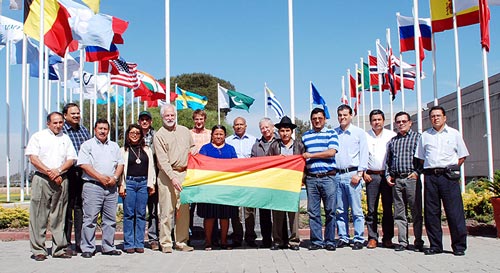By Sam Storr/CIMMYT
Representatives from the national agricultural systems in Bolivia and Ecuador visited CIMMYT at El Batán, Mexico, from 7-9 April to lay the framework for future collaboration to improve maize production.
The meeting was preceded by a visit from Colombian officials and will be followed by a visit of officials from Peru at the end of April, completing initial talks between CIMMYT and the four South American countries. “We are determining how CIMMYT can work more quickly and concretely to help feed populations in alliance with these countries. Bolivia is self-sufficient in maize, but it could become an exporter,” said Luis Narro, plant breeder for CIMMYT in Colombia. “Ecuador is importing more, but the government has decided to achieve self-sufficiency in two years. So they want to know how CIMMYT can be more involved in solving the problem of production in these countries, and we hope to improve the lives of producers.” Visitors included Nemesia Achacollo, Bolivian minister for land and rural development; Gabriel Hoyos, executive director general of the National Institute of Agrarian and Forestry Innovation (INIAF, Bolivia); and José Luis Zambrano, director of research at Ecuador’s Autonomous National Institute of Agrarian Research (INIAP).

Presentations on advanced maize research at CIMMYT, including an introduction to MasAgro work in sustainable intensification were conducted for the delegation. After learning more about the extent of work undertaken by CIMMYT, Achacollo was impressed by the challenges facing Bolivia in establishing its own international quinoa center. The delegation members also visited the Agua Fría Experimental Station in Puebla, where Achacollo announced that the Bolivian government would create policies for young Bolivian researchers to train in similar facilities. “We must invest in future generations so that they can provide the foundation of agricultural knowledge,” she said. “We cannot be left behind.”
 Nutrition, health and food security
Nutrition, health and food security 
